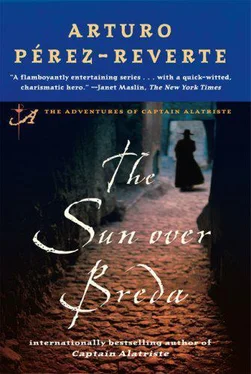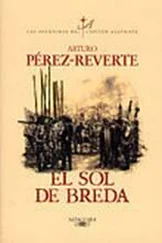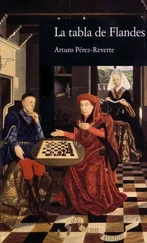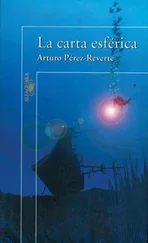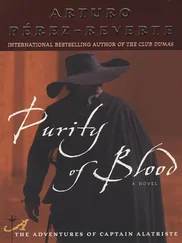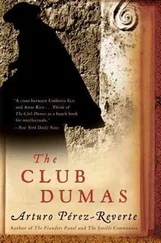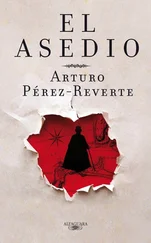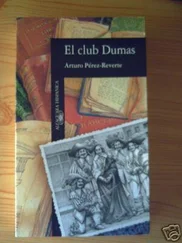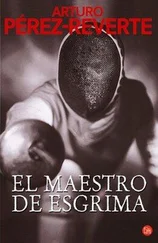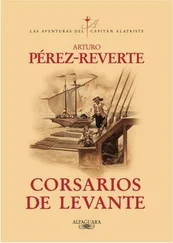Arturo Pérez-Reverte - The Sun Over Breda
Здесь есть возможность читать онлайн «Arturo Pérez-Reverte - The Sun Over Breda» весь текст электронной книги совершенно бесплатно (целиком полную версию без сокращений). В некоторых случаях можно слушать аудио, скачать через торрент в формате fb2 и присутствует краткое содержание. Жанр: Старинная литература, на английском языке. Описание произведения, (предисловие) а так же отзывы посетителей доступны на портале библиотеки ЛибКат.
- Название:The Sun Over Breda
- Автор:
- Жанр:
- Год:неизвестен
- ISBN:нет данных
- Рейтинг книги:5 / 5. Голосов: 1
-
Избранное:Добавить в избранное
- Отзывы:
-
Ваша оценка:
- 100
- 1
- 2
- 3
- 4
- 5
The Sun Over Breda: краткое содержание, описание и аннотация
Предлагаем к чтению аннотацию, описание, краткое содержание или предисловие (зависит от того, что написал сам автор книги «The Sun Over Breda»). Если вы не нашли необходимую информацию о книге — напишите в комментариях, мы постараемся отыскать её.
The Sun Over Breda — читать онлайн бесплатно полную книгу (весь текст) целиком
Ниже представлен текст книги, разбитый по страницам. Система сохранения места последней прочитанной страницы, позволяет с удобством читать онлайн бесплатно книгу «The Sun Over Breda», без необходимости каждый раз заново искать на чём Вы остановились. Поставьте закладку, и сможете в любой момент перейти на страницу, на которой закончили чтение.
Интервал:
Закладка:
Who spoke here of war? Is our memory still clear? When the name Castile is spoken does the earth still shake with fear?
I hope that Your Mercies will make allowances when I so immodestly include myself in this panorama, but at that point in the Flanders campaign, that very young Íñigo Balboa you knew during the adventure of the two Englishmen, and later in the incident at the convent, was no longer quite so young. The winter of ’24, which the Viejo Tercio de Cartagena spent garrisoned in Oudkerk, found me in the full vigor of my youth. I have already said that the smell of gunpowder was nothing new to me, and although I could not, because of my age, carry a pike, sword, or harquebus in combat, my status as the mochilero of the squad in which Captain Alatriste served had made me a veteran of every imaginable adventure. My instincts were already those of a soldier: I could smell a lighted harquebus cord half a league away, I knew the pounds and ounces of every cannon ball or musket shot by the sound, and I was developing a singular talent in the task we mochileros called foraging: incursions into surrounding territory, scavenging for firewood and food. Our raids were indispensable when, as now, the land had been devastated by war, supplies were short, and everyone had to scramble for himself. Ours was not an easy task, and the proof is that in Amiens, the French and English had killed some eighty mochileros , some only twelve years old, as they foraged through the countryside—inhuman butchery, even in time of war—which the Spaniards appropriately avenged by knifing two hundred of Albion’s soldiers, because those who dole it out must also be able to take it. And if in the long run the subjects of the queens and kings of England beleaguered us in many campaigns, it is fair to record that we, in turn, dispatched not a few, and that, without being as robust as they or as blond or as loudmouthed when drinking beer, when it came to arrogance, no one ever put us in the shade. Besides, if the Englishman fought with the courage of national pride, we did so out of national desperation, which was not—no definitely not—chickenfeed. So, we made them pay with their accursed hides, theirs, and so many others.
Well, this was just—it’s nothing really— a leg I lost, blown off by a volley. What can those Lutheran dogs be thinking, to take my legs but leave me my hands.
In short: During that winter of wavering light, fog, and gray rain, I foraged and pillaged and scavenged from one end of that Flemish land to the other. It was not arid like the greater part of Spain—God did not smile upon us even in that—but nearly all green, like the fields of my native Oñate, though much flatter and scored with rivers and canals. In such activities—stealing hens, digging turnips, holding my dagger to the throats of peasants as hungry as I and taking their meager store of food—I revealed myself to be a consummate specialist. I did, and would in years to come, many things I am not proud to remember, but I survived the winter, I aided my comrades, and I became a man in all the disparate and terrible meanings of the word.
To serve my king, I took up the sword ’ere downy fuzz covered my lip.
Words Lope wrote about himself. I also lost my virginity, or my virtue, which is the way the good Dómine Pérez put it. For at that point, in Flanders, half-lad and half-soldier, that was one of the few things I had left to lose. But that is a very personal and intimate story, and I have no intention of detailing it here for Your Mercies.
Diego Alatriste’s squad was the principal unit fighting under the banner of Captain don Carmelo Bragado, and it was formed only of the best: not a lily-livered man among them, only soldiers quick with a sword and born to suffer and to fight. All of them were veterans who had under their belts at least the Palatinate campaign or years of service in the Mediterranean with the tercios of Naples or Sicily, which was the case of the Malagüeño Curro Garrote. Others, like the Mallorcan José Llop or the Basque Mendieta, had fought in Flanders, before the Twelve Years’ truce, and the yellowed service records of a few, like Copons, who was from Huesca, and like Alatriste himself, went back as far as the last years of our good Philip II, may God hold that good king in glory. It was under Philip’s old banners that—as Lope would say—the swords and beards of those two had appeared simultaneously.
Taking losses and additions into account, the squad usually numbered between ten and fifteen men, depending on the situation, and it had no specific function in the company other than to move quickly and back up others in their various actions, carrying half a dozen harquebuses and about as many muskets. The squad operated in a unique way: It had no cabo , the leader appointed by the captain, for in any engagement they were under the direct orders of Captain Bragado himself, who might use them in the line with others from the unit or give them a free hand in surprise attacks, scouting missions, skirmishes, and raids. They were all, as I said, conditioned to gunfire and expert in their responsibilities, and it was perhaps for that reason that in their operations—even without having identified a leader or acting under a formal hierarchy of any sort—they had, in a kind of tacit accord, bestowed authority on Diego Alatriste.
As for the three escudos that went along with being head of the squad, it was Captain Bragado who collected them, in addition to the wages of forty escudos due as actual captain of the unit, since that was how he was listed in the documents of the tercio. Although he was a man of stature, owing to his family background, and a reasonable officer as long as his discipline was not questioned, don Carmelo Bragado was one of those men who hears clink and says mine . He never let so much as a maravedí get past him, and even went so far as to keep dead and deserters on the rolls in order to collect their pay…when there was pay. However, I have to say that it was a widespread practice, and in Bragado’s favor we can say two things: He never refused to help soldiers in need, and he personally had twice proposed Diego Alatriste’s promotion to squad leader, though both times Alatriste had declined.
As to the esteem in which Bragado held my master, I need say only that four years earlier at White Mountain, when General Tilly’s first assault and second attack under the orders of Count Bouquoy and Colonel don Guillermo Verdugo failed, Alatriste and Captain Bragado (and Lope Balboa, my father, right along with them) had climbed shoulder to shoulder up the slopes, fighting for every foot of corpse-strewn terrain. Then a year after that, on the plains of Fleurus, when don Gonzalo de Córdoba won the battle but the Cartagena tercio was nearly annihilated after holding fast against several cavalry charges, Diego Alatriste was among the last of the dauntless Spaniards who never broke ranks around the flag that, with the standard bearer dead, along with all the other officers, was held high by Captain Bragado himself. And, pardiez , in that time, and among those men, such things still counted for something.
It was raining in Flanders. ’Pon my word, it rained pitchforks and anvils that accursed autumn and through that whole accursed winter, turning to pure mud the flat, shifting, swampy land that was crossed in every direction by rivers, canals, and dikes that seemed to have been laid out by the hand of the devil himself. It rained for days, for weeks, for months, until the gray landscape of low clouds was completely erased. It was a strange land with an unfamiliar tongue, populated by people who despised and at the same time feared us; a countryside denuded by the season and the war, lacking any defense against the cold, the wind, and the water. There were no peaches in that land, or figs, or cherries, or peppers, or saffron, or olives, or oil, or oranges, or rosemary, or pines, or laurels, or cypresses. There was not even any sun, only a tepid disk that moved indolently behind a veil of clouds. The place our iron-and-leather-clad men had come from, men who plodded on though their bodies yearned for the clear skies of the south, was far away, as far as the ends of the earth. And those rough, proud soldiers, now in the lands of the north repaying the courtesy of a visit received centuries before at the fall of the Roman empire, recognized that they were very few in number and a great distance from any friendly country.
Читать дальшеИнтервал:
Закладка:
Похожие книги на «The Sun Over Breda»
Представляем Вашему вниманию похожие книги на «The Sun Over Breda» списком для выбора. Мы отобрали схожую по названию и смыслу литературу в надежде предоставить читателям больше вариантов отыскать новые, интересные, ещё непрочитанные произведения.
Обсуждение, отзывы о книге «The Sun Over Breda» и просто собственные мнения читателей. Оставьте ваши комментарии, напишите, что Вы думаете о произведении, его смысле или главных героях. Укажите что конкретно понравилось, а что нет, и почему Вы так считаете.
